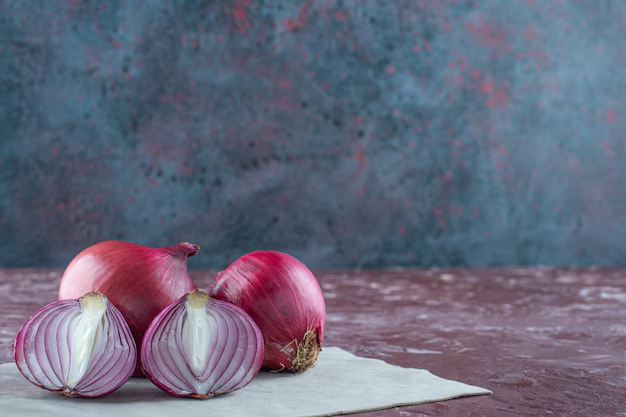Can You Store Onions in the Refrigerator? The Complete Guide to Onion Storage and Shelf Life 🧅
When it comes to storing onions, many of us are left scratching our heads. Should they sit on the kitchen counter, in a pantry, or in the refrigerator? If you’ve ever pondered this question, you’re not alone. In this comprehensive guide, we’ll unravel the mystery of onion storage and explore whether refrigeration is a suitable option.
Understanding Onion Storage Needs
The Composition and Nature of Onions
Onions are a staple in kitchens worldwide, prized for their ability to add flavor to countless dishes. They are part of the allium family, which also includes garlic, shallots, and leeks. The bulb of an onion is made up of layers that are designed to protect the core and preserve its moisture. This structure plays a critical role in determining the best storage methods.
The Role of Temperature and Humidity
Onions prefer a cool, dry, and well-ventilated environment. They thrive in temperatures between 45 to 55 degrees Fahrenheit. High humidity can cause onions to sprout or rot faster, while too much heat can dry them out, affecting both flavor and texture.
To Refrigerate or Not to Refrigerate?
Advantages of Refrigerating Onions
1. Extended Shelf Life:
Refrigerating onions can slow down their metabolic processes, potentially extending their shelf life. This is particularly useful if you purchase onions in bulk and need them to last longer.
2. Preservation of Freshness:
For cut or peeled onions, refrigeration is essential. Once an onion is cut, it begins to deteriorate rapidly. The cool environment of a refrigerator can help maintain freshness, allowing you to extend its usability.
Disadvantages and Considerations
1. Texture Changes:
Whole onions stored in the refrigerator often become soft and mushy. The cold, moist environment encourages cellular breakdown, impacting their ultimate use in dishes.
2. Flavor Intensification:
The high humidity in a refrigerator can cause onions to absorb surrounding odors and flavors, which might lead to an undesirable taste when cooked.
3. Risk of Mold:
Refrigeration increases the likelihood of condensation within the onion’s layers, leading to mold growth and spoilage.
Best Practices for Onion Storage
Whole Onions
For long-term storage, keep whole onions in a cool, dry, and dark place like a pantry or cellar. Ensure they have room to breathe by storing them in a mesh bag or basket, and avoid direct sunlight to prevent sprouting. Whole onions kept under these conditions can last several weeks to months.
Cut or Peeled Onions
Once an onion has been cut, wrap it tightly in plastic wrap or place it in an airtight container before storing it in the refrigerator. Cut onions should be used within a week for optimal flavor and quality.
Related Subtopics for Effective Storage
Avoiding Cross-Contamination
When storing onions in the refrigerator, ensure they are kept away from foods that might absorb their pungent aroma. Use airtight containers to prevent the transfer of onion flavor to other products.
Combining with Potatoes: A Common Mistake
A frequent error in home kitchens is storing onions alongside potatoes. Potatoes release moisture and gases that can cause onions to spoil quickly. For the best results, store these items separately.
Utilizing Freezer Storage
If you find yourself with excess onions, consider freezing them as an alternative storage method. Chop onions into desired sizes, spread them on a baking sheet to freeze individually, then store them in freezer-safe bags. While frozen onions are suitable for cooked dishes, the freezing process alters their texture, making them less ideal for raw consumption.
Practical Tips for Extending Onion Shelf Life
Key Takeaways and Quick Tips
- Store whole onions in a cool, dry, dark place with good airflow.
- Refrigerate cut or peeled onions in airtight containers and use within a week.
- Keep onions away from potatoes to prevent premature spoilage.
- Freeze excess onions for extended use in cooking.
Simple Onion Storage Guide 📌
| Situation | Recommended Storage Method |
|---|---|
| Whole, unpeeled onions | Cool, dry place; avoid refrigeration |
| Cut or peeled onions | Airtight container in the refrigerator |
| Excess onions | Chop and freeze in batches |
Final Thoughts on Onion Storage
Determining the best method for storing onions depends largely on their state: whole or cut. While whole onions benefit from room-temperature storage, refrigeration is essential for cut onions to maintain freshness and prevent spoilage. Understanding these nuances empowers you to make informed decisions, preserving your onions' quality and extending their shelf life.
By optimizing how you store onions, you not only reduce food waste but also enhance their usability in the kitchen, ensuring that every dish benefits from their rich flavor. So, the next time you’re in the pantry or at the refrigerator door, you’ll know exactly where your onions belong and why. Happy cooking!

